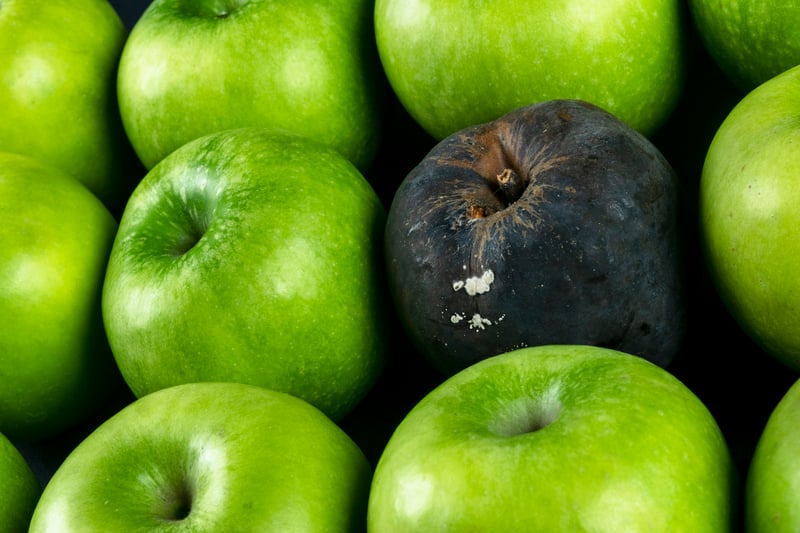“One bad apple can spoil the whole bunch.” Christ’s followers must bear good fruit. They are also to know false teachers “by their fruits”–discerning bad fruit.

In the early 1600s, as European settlers began to arrive in America at the Massachusetts Bay Colony, they encountered a wilderness where they intended to make their home.
Among the early settlers was an English Puritan named John Endicott, who became governor of the colony in 1629. In 1630 John Endicott planted a pear tree sapling that had been transported across the Atlantic. He is said to have made the following statement when he planted the tree: “I hope the tree will love the soil … and no doubt when we have gone the tree will still be alive.”
John Endicott got his wish. That tree is still alive in Danvers, Massachusetts, and bearing fruit. It has survived cold winters, hurricanes and even a vandal attack. Dubbed “the Endicott tree,” it found fertile soil in a new land and flourished beyond anything the early settlers could have imagined. It is an incredible tribute to the ability of a good tree to bear good fruit.
Bearing fruit Bible verse
In His Sermon on the Mount message, Jesus instructed His disciples about the importance of bearing good fruit. He also talked about the need for them to recognize the type of people they were dealing with by evaluating the type of fruit those people bear.
He simplified the concept by explaining: “Even so, every good tree bears good fruit, but a bad tree bears bad fruit. A good tree cannot bear bad fruit, nor can a bad tree bear good fruit” (Matthew 7:17-18).
In an orchard, there might be some trees that are not fully good or fully bad, but in Jesus’ analogy, there are only two kinds of spiritual trees. He is not saying that the bad spiritual tree might not appear in its leaves or buds to be good, but that the end result is always bad.
He went on to explain that not bearing any fruit is not an option: “Every tree that does not bear good fruit is cut down and thrown into the fire” (Matthew 7:19).
“Every tree that does not bear good fruit is cut down and thrown into the fire” (Matthew 7:19).
What exactly did Jesus mean when He talked about good fruit and bad fruit? And how are those things produced in human lives?
Good fruit and bad fruit
Shortly before His crucifixion, Jesus talked to the disciples about the way for them to continue bearing good fruit.
Notice John 15:1-5: “I am the true vine, and My Father is the vinedresser. Every branch in Me that does not bear fruit He takes away; and every branch that bears fruit He prunes, that it may bear more fruit. You are already clean because of the word which I have spoken to you. Abide in Me, and I in you. As the branch cannot bear fruit of itself, unless it abides in the vine, neither can you, unless you abide in Me. I am the vine, you are the branches. He who abides in Me, and I in him, bears much fruit; for without Me you can do nothing.”
A little later that same evening, Jesus explained how He would make it possible for them to abide in Him and bear the same fruit. He would send the Holy Spirit after His death—the mind and power of God—to abide in them and guide them.
“But now I go away to Him who sent Me, and none of you asks Me, ‘Where are You going?’ But because I have said these things to you, sorrow has filled your heart. Nevertheless I tell you the truth. It is to your advantage that I go away; for if I do not go away, the Helper will not come to you; but if I depart, I will send [the Holy Spirit] to you” (John 16:5-7).
For more information on the Holy Spirit and how it works in our lives, please see the article “How Do You Know You Have the Holy Spirit?”
Fruit of the Spirit
The Holy Spirit, working in our minds, produces the fruit of righteousness in terms of the character we have and the way we live our lives.
The apostle Paul listed some of these characteristics in his letter to the Galatians: “But the fruit of the Spirit is love, joy, peace, longsuffering, kindness, goodness, faithfulness, gentleness, self-control. Against such there is no law” (Galatians 5:22-23).
The Holy Spirit, working in our minds, produces the fruit of righteousness in terms of the character we have and the way we live our lives.
Indeed, to truly abide in the vine that is Jesus Christ, the Holy Spirit should help us in bringing our mind into accord with His by “casting down arguments and every high thing that exalts itself against the knowledge of God, bringing every thought into captivity to the obedience of Christ” (2 Corinthians 10:5).
In contrast to the fruit of the Spirit, the apostle Paul listed the opposite kind of fruit that people can produce, calling these actions and attitudes the “works of the flesh.” Those works include “adultery, fornication, uncleanness, lewdness, idolatry, sorcery, hatred, contentions, jealousies, outbursts of wrath, selfish ambitions, dissensions, heresies, envy, murders, drunkenness, revelries and the like” (Galatians 5:19-21). That is quite a sobering list of character flaws!
The Bible encourages us to examine ourselves and to beware of self-deception (2 Corinthians 13:5; Galatians 6:4, 7). We must be sure we are producing good fruit. The 10 articles in our “Fruit of the Spirit” section can help.
A Christian’s personal responsibility to produce the fruit of the Spirit, rather than the works of the flesh, is clear. But what about our responsibility to recognize the fruit produced by others? That recognition will affect the way we allow the example of others to influence our decisions and the way we live our lives.
“You will know them by their fruits” meaning
It is helpful to reexamine Jesus’ instructions to His disciples in Matthew 7. His words concerning good trees bearing good fruit and bad trees bearing bad fruit were sandwiched in between warnings about those who would try to deceive. He also told the disciples how to avoid that deception.
God has the ability to discern the heart and mind of a person and to know what someone’s intentions are. As humans, we are not given that power on our own, and we can often be wrong when we assume the intentions of another.
So how are we to avoid judging another wrongly while still not being led astray by someone who intends to deceive us? Jesus Christ gives us the answer: We can evaluate the consistent actions and results—the fruit of someone’s behavior.
A bad apple truly can spoil the bunch, and a deceptive person can mislead and corrupt those who don’t keep their distance.
Bad fruit provides a warning to Jesus’ followers to stay away, since a bad apple truly can spoil the bunch, and a deceptive person can mislead and corrupt those who don’t keep their distance.
“Beware of false prophets, who come to you in sheep’s clothing, but inwardly they are ravenous wolves. You will know them by their fruits. Do men gather grapes from thornbushes or figs from thistles?” (Matthew 7:15-16).
After telling them that good trees can bear only good fruit and bad trees can bear only bad, Jesus summed it up in verse 20: “Therefore by their fruits you will know them.”
Fruit of sin
What follows in the Sermon on the Mount is an example of people who “talk a good fight.” These are people who say the right things and seem to be impressive in their deeds, but in truth produce only bad fruits—sin and lawlessness.
“Not everyone who says to Me, ‘Lord, Lord’ shall enter the kingdom of heaven, but he who does the will of My Father in heaven. Many will say to Me in that day, ‘Lord, Lord, have we not prophesied in Your name, cast out demons in Your name, and done many wonders in Your name?’ And then I will declare to them, ‘I never knew you; depart from Me, you who practice lawlessness!’” (Matthew 7:21-23).
Pious words and seemingly impressive deeds mean nothing if a person is not living a godly life and following the example of Jesus Christ!
Spiritual discernment
The author of the book of Hebrews expands on this concept when he talks about our need to have an ingrained habit of making decisions based on God’s Word and based on the ability to know good fruit from bad.
“For though by this time you ought to be teachers, you need someone to teach you again the first principles of the oracles of God; and you have come to need milk and not solid food. For everyone who partakes only of milk is unskilled in the word of righteousness, for he is a babe. But solid food belongs to those who are of full age, that is, those who by reason of use have their senses exercised to discern both good and evil” (Hebrews 5:12-14, emphasis added).
Someone who is grounded in the Word of God will be able to distinguish good from evil. We must be able to discern good fruit from the works of the flesh.
What should you do? Bear good fruit
How can a Christian bear good fruit, while also not being deceived by those who may appear to be godly, but are not? The apostle Paul gives us the answer to both questions in his letter to the Colossians.
Consider that a good tree results from a tree being firmly grounded in good soil and properly cared for.
With that in mind, notice Paul’s words in Colossians 2:6-10: “As you therefore have received Christ Jesus the Lord, so walk in Him, rooted and built up in Him and established in the faith, as you have been taught, abounding in it with thanksgiving. Beware lest anyone cheat you through philosophy and empty deceit, according to the tradition of men, according to the basic principles of the world, and not according to Christ. For in Him dwells all the fullness of the Godhead bodily; and you are complete in Him, who is the head of all principality and power.”
We have it in our power to make the choice to be grounded in the Word of God and in the example of Jesus Christ. Doing so will not only allow us to bear godly fruit, but to recognize the same when we see it! By receiving the gift of God’s Holy Spirit, we are given the responsibility of recognizing and producing godly fruit in our lives.
To learn more about the steps in the conversion process and how to receive and use the Holy Spirit, read our free booklet Change Your Life!





